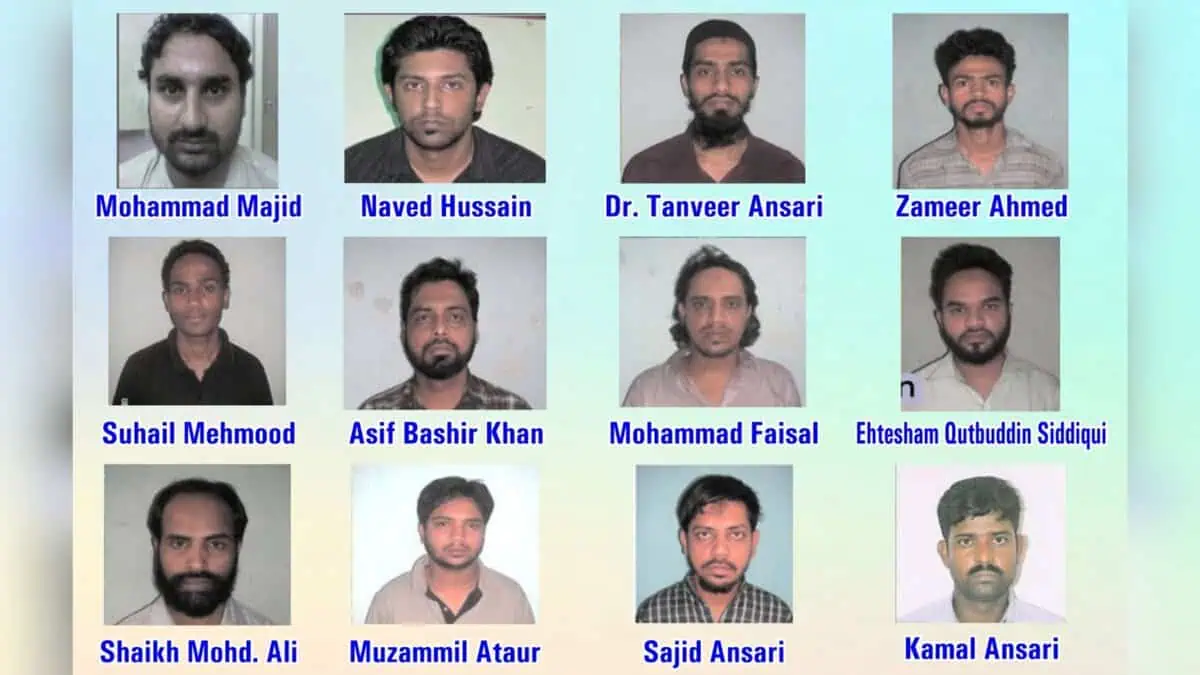
Mumbai: The 12 persons, acquitted in the July 11, 2006 train blasts case, were charged of being members of the banned Students’ Islamic Movement of India (SIMI).
The Maharashtra Anti Terrorism Squad (ATS) had alleged that some of the accused had received training in terror camps in Pakistan.
Seven blasts ripped through Mumbai local trains at various locations on the western line on July 11, 2006, killing more than 180 persons and injuring several others.
The roles of the accused are as follows:
1) Kamal Ahmed Ansari: Died in 2021 pending hearing of the appeal at the age of 50. Ansari was a resident of Madhubani district in Bihar and was accused of receiving arms training in Pakistan. He was also accused of planting the bomb that exploded at Matunga.
2) Mohammed Faisal Rahman Shaikh: The 50-year-old accused from Mira Road in neighbouring Thane district was accused of being one of the main conspirators. As per the prosecution, he had obtained money from Pakistan, assembled bombs and planted one of them in a train.
3) Ehtesham Siddiqui: Aged 42, Siddiqui was accused of carrying out a recce of the trains and planting the bomb that went off at Mira-Bhayandar.
4) Naveed Hussain Khan Rasheed: Aged 44, Rasheed, a call centre employee at the time, was accused of assembling bombs and planting one that exploded in a train at Bandra. He was a resident of Secunderabad and was arrested from there.
5) Asif Khan Bashir Khan: The 52-year-old was accused of helping assemble the bombs and planting one that exploded at Borivali. A civil engineer, Khan was a resident of Jalgaon and accused of being a key member of SIMI.
Accused who were sentenced to life imprisonment
1) Tanveer Ahmed Ansari: Resident of Agripada in Mumbai, the 50-year-old was convicted for attending terror camps in Pakistan and also conducting a recce of the trains.
2) Mohammed Shafi: Aged 46, Shafi was accused of running a hawala racket and procuring money from Pakistan for the blasts.
3) Shaikh Mohammed Ali Alam: The 55-year-old was charged with assembling bombs at his house in suburban Govandi with the help of Pakistanis who had sneaked into India. He was also accused of being a member of SIMI.
4) Mohammed Sajid Ansari: The 47-year-old resident of Mira Road was accused of procuring timers for the bombs and helping assemble them. He was also accused of harbouring two Pakistani nationals.
5) Muzammil Rahman Shaikh: The 40-year-old youngest accused in the case, a software engineer, was accused of getting trained in Pakistan and also conducting recce of the local trains. His brothers — Faisal and Raahil — are also accused in the case but were never caught. They were allegedly the main planners of the conspiracy.
6) Suhail Mehmood Shaikh: Aged 55, Shaikh was accused of having taken arms training in Pakistan and also carrying out a recce of the trains to be targeted.
7) Zameer Rehman Shaikh: The 50-year-old was accused of attending conspiracy meetings and also receiving training in Pakistan.
Prosecution failed to prove case: HC
A special bench of Justices Anil Kilor and Shyam Chandak said the prosecution has failed to even bring on record the type of bombs used in the crime and that the evidence relied on by it was not conclusive to convict the accused persons.
“The prosecution has utterly failed to prove the case against the accused. It is hard to believe that the accused committed the crime. Hence their conviction is quashed and set aside,” the HC said.
The bench refused to confirm the death penalty imposed on five of the convicts and the life imprisonment on the remaining seven by a special court in 2015, and acquitted them. It said the accused shall be released from jail forthwith if not wanted in any other case.
The witness statements and alleged recoveries made from the accused have no evidentiary value, the HC said while quashing the conviction of the 12 persons, of whom five had been sentenced to death and seven to life imprisonment by a special court.


